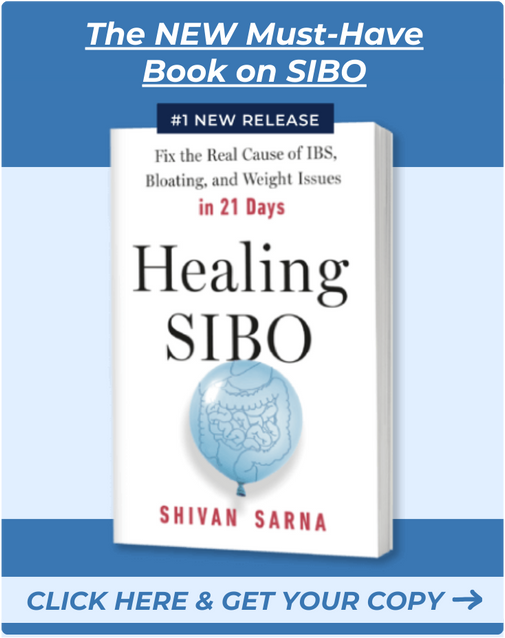Whether you’re already diagnosed or just seeking answers, today I want to give you the ultimate guide to Small Intestine Bacterial Overgrowth (SIBO). I’m covering all the fundamentals: what SIBO is, the symptoms, and how to find out if you have it.
“Shivan, have you ever heard of something called SIBO?”
I was on the phone, catching up with an old friend.
By that point, I had been struggling with digestive problems for more than 20 years. And as anyone with unexplained digestive problems can tell you, I was desperate to find a cause – and a cure.
After we hung up, I called my gastroenterologist and asked him the same question.
He didn’t know much about it, but agreed to test me for it.
A couple weeks later, the test results were in: negative.
At first, I felt defeated. Another dead end. But I’m not a quitter – persistence is my superpower. So I kept researching and asking questions… and they always led me back to SIBO – small intestine bacterial overgrowth.
I decided to get a second opinion. And that was one of the best decisions I ever made!
I did have SIBO – test results confirmed it. Sadly, I’ve learned this happens all too often: misinformation about SIBO and how to test for it leave millions of people undiagnosed.
Could you be one of them?
What Is SIBO?
SIBO stands for Small Intestine Bacterial Overgrowth.
The name is actually pretty descriptive – even if it’s a mouthful to say. SIBO is when there is too much bacteria in the small intestine (part of our digestive system).
Remember that our digestive system is pretty big – it starts at our mouth, then goes into our esophagus, to our stomach, to the small intestine, and then the large intestine.
Our small intestine is actually longer than the large intestine, and it’s where most of the food we eat is broken down and absorbed.
In a healthy, normal small intestine, there should be almost no bacteria present – instead bacteria belongs in the large intestine. When bacteria gets stuck in the small intestine (or flows back up from the large intestine) SIBO can occur.
It’s actually a simple idea – bacteria grows where it shouldn’t, in the small intestine.
But the why and the results of SIBO are a bit more complicated.
Why Should We Care About SIBO?
20% of the world’s population is thought to have IBS – Irritable Bowel Syndrome.
IBS was once believed to be a syndrome – meaning a group of symptoms like bloating, constipation, and diarrhea – without a known cause or cure.
But now, research shows that the cause of IBS symptoms in as much as 60% of people is actually SIBO.
Think of it like this: if 100 people are in a room, 20 of those people will have IBS.
And 12 of those people will actually have SIBO.
Now imagine that on a worldwide scale! Millions of people have SIBO, are suffering the symptoms of it, and just don’t know it.
SIBO isn’t a “new” disease – it has likely been occurring as long as people have been alive. But the understanding and widespread knowledge of SIBO is new. It was first recognized in the 1960s – but doctors thought it only rarely occurred. Then, in just the last 15 years, numerous studies have shown SIBO to be a root cause of IBS.
SIBO is not a fad or just a theory – it is a well-researched disease that can be treated effectively. Information about SIBO needs to widespread so that millions of people can stop suffering.
Signs & Symptoms of SIBO
The most common symptoms of SIBO are the same ones seen commonly in IBS:
- Bloating
- Constipation and/or diarrhea
- Fatty stools
- Abdominal pain and discomfort
- Acid reflux
- Nausea
- Gastroparesis
- Dyspepsia
- Excessive gas (burping and farting)
- Fatigue
- Food sensitivities (especially to carbohydrates)
- Depression and anxiety
- Leaky gut
- Anemia
But symptoms directly related to SIBO aren’t the only thing you should be aware of – there are also many other conditions that are linked to SIBO. These are a few of the most common SIBO-related conditions:
- Rosacea
- Restless leg syndrome
- Chronic prostatitis
- Fibromyalgia
- Celiac Disease
- Depression
- Diabetes
- Lyme Disease
What Causes SIBO?
You might be thinking “How could all those different symptoms and diseases be related to SIBO?”
Remember Hippocrates said “All disease begins in the gut?” He wasn’t wrong! The gut is the center of our immune system, and generally when something is wrong in any part of the body, there is also something wrong with gut.
So what causes SIBO to happen? It isn’t a simple answer- in fact, this is a HUGE topic.
Dr. Allison Siebecker says, there are two main categories for causes of SIBO: underlying causes and SIBO risk factors. Underlying causes for SIBO are when the body’s own natural protections against SIBO fail.
Some of the natural protections your body has against SIBO include:
- Hydrochloric acid produced in the stomach
- Digestive enzymes produced in the stomach and small intestine
- Bile from the gallbladder
- The immune system
- The migrating motor complex
- The anatomy of the small intestine
On top of this, there are also risk factors that make you more likely to develop SIBO:
- Diseases (everything from food poisoning to cancer)
- Drugs and prescription medications
- Genetic predisposition
- Stress
- Surgery
There is a huge number of possible combinations of underlying causes and risk factors for SIBO – few people have the exact same causes.
Could I Have SIBO?
After learning about SIBO, are you wondering if you could have it?
The most common way to be tested for SIBO is with a breath test. Some doctors also test for SIBO using an endoscopy with a culture or a special type of blood test.
But be aware – there are some tests that don’t accurately diagnose SIBO – most commonly, stool tests. There are no stool tests available that can tell you if you have SIBO.
Breath tests for SIBO are the most common. SIBO breath tests can be ordered by your doctor or practitioner -and in many places, you can find at-home tests you can order yourself or through a practitioner.
The breath tests measure levels of hydrogen and methane gas in your breath – these two gasses are produced by the overgrown bacteria in the small intestine. It’s very important to find a lab or doctor who tests for both methane AND hydrogen gas.
But unlike a simple blood test, breath tests can’t tell you simply whether you do or don’t have SIBO – instead they’ll give you data that has to be interpreted by a healthcare practitioner.
A trained practitioner can look at the levels of methane and hydrogen at different points in the test to understand if you do have SIBO, and what type of SIBO you have – this then leads to finding the right treatment for SIBO.
This is a really important point, because different types of SIBO need different treatments! What works for one person won’t necessarily work for another.
I Have SIBO – Now What?
If you think you have SIBO, or you’ve already been diagnosed with SIBO, you’re in the right place!
SIBO is a complicated condition with many causes and even more potential treatments. New research and advances in diagnosing and treating SIBO are being made all the time, too.
Unfortunately, that means that many people waste time with inaccurate, outdated information or the wrong treatment for their SIBO.
We created SIBO SOS™ to fix this problem – our goal is to bring you the most comprehensive, updated information on SIBO testing and treatment so that you can be informed and empowered. We interview SIBO experts and share the information directly with you, patients and practitioners.
If you’re newly diagnosed or still wondering if you could have SIBO, the best place to start is the SIBO Solved Series created by my personal doctor and SIBO expert, Dr. Allison Siebecker (and me, Shivan Sarna as your host)!
In the SIBO Solved Series we cover signs, symptoms, and causes of SIBO – plus go in-depth on testing (including which specific tests to ask for) and then dive deep into treatment – everything from natural to prescription, and dietary options, too.
Get a free video + Symptomatic Relief Guide here and be on your way to recovery from SIBO!







18 thoughts on “What is SIBO? The ultimate guide to understanding Small Intestine Bacterial Overgrowth”
Shivan, thank you for this article. It is so well broken down and now I know where I can start with the masterclass you mentioned.
Keep up your great work for this community of sufferers and professionals!
Thanks Nicole 🙂 I will pass your comment on to Shivan!
Diagnosed with colitis, then not. In past had constipation/ diareah, lots of gas! Pain in abdomen left side. I’m gluten and dairy free, at times bowel in continence. Help! I eat a very clean diet as well.
Therese, did you see the Masterclass with Dr. Robillard? I believe this interview can help you figure things out with your diet and maybe some of the foods to eat and avoid. His book Fast Tract Diet IBS would be very helpful. His Facebook group and this group are amazing together! IBS (Irritable Bowel Syndrome) – Fast Tract Digestion: Diet that Addresses the Root Cause, SIBO (Small Intestinal Bacterial Overgrowth) without Drugs or Antibiotics: Foreword by Dr. Michael Eades
Thanks Nicole!! Therese – you can find Dr. Robillard’s MC here.
Hey I have SIBO and have been treated with 2 rounds of Rifaximin. Eventually found out it was methane dominant and was treated with Neomycin and More Rifaximin. I was told to stay on the Phase one of the SIBO diet for the entire nine months. I quit that doctor after I lost so much weight from np thyroid he put me on and have no idea what to do. I have started eating some things out of my diet, but want to find the underlying cause of my SIBO. HOW DO I DO THAT? I know my Vitamin D is super low, but that use to make me very sick before I figured out I had SIBO. Any thoughts would be appreciated.
Hi Haley, wonderful to hear from you! So sorry to hear you and your last provider wasn’t such a great match!
But you absolutely need one to help you prioritize your care.
I’d be curious to know if you found our list of the experts we’ve featured in our programs and series… if you haven’t, you can find it here. It’s a free download 🙂
Also, Dr. Siebecker actually did an entire class on just underlying causes 🙂 if you want to look that up, you can find it here.
Carole Dobies, let me know if you find Dr. Champion helpful please! I live in MN also and would be interested in his protocol IF it works! ~Deborah
Is Candida also a form of SIBO?? Can antibiotics be used to treat SIBO, since it is bacterial overgrowth??
Hi Deena, This is a great question for Dr. Siebecker. We have a 3 live Q&A sessions this week if you would like to join us there is still time to register here: Dr. Allison Siebecker
Can pau D Arco help sibo?
i read that all parts of the digestive tract has its own microbes ,the whole body has… its the overgroawth of pathogenic species and thier endo/exo toxins that poisons and disrupts our health…. major part of the solution … change our dietary habits to support benificial microbes and they control or eliminate the pathogenic microbes
Hi Shivan
Thankyou so much for all you do for us.
I have an intolerance of so many foods as I have salicylate problems. I am able to eat around 15 items of food which is not much really. I don’t grumble because there are many people who have nothing to eat in the world.
Would be interested in your thoughts.
Kind regards
“What is SIBO”: An excellent, plain English summation of how it is! Thank you very much Shivan, for this piece, which had to require many hours on your part.
I am so glad you liked it! Thank you so much. I hope you are well Christine!
From Dr Siebecker’s information I know of a local SIBO ND JUST 15 MINUTES away from me in the Minneapolis area. I will eventually contact Dr Champion. He looks so young so I hope he is good!! I’m thankful for his name.
I have SIBO and was also diagnosed with diverticulitis in the spring. I’d love to hear more about how to manage these 2 conditions diet-wise since with SIBO we need to be careful with fibre and DV needs more fibre to prevent flares! Thanks for all you do! 🙏🏻🙏🏻🙏🏻
A little fiber can go a long way. Have you tried partially hydrolyzed guar gum?